51 years ago today, the Bosphorus Bridge was completed, linking mainland Europe with Anatolia over the Bosporus Straits for the first time. It’s a gravity-anchored suspension bridge with steel towers and inclined hangers, and upon its completion was the 4th longest suspension bridge in the world. READ more… (1973)
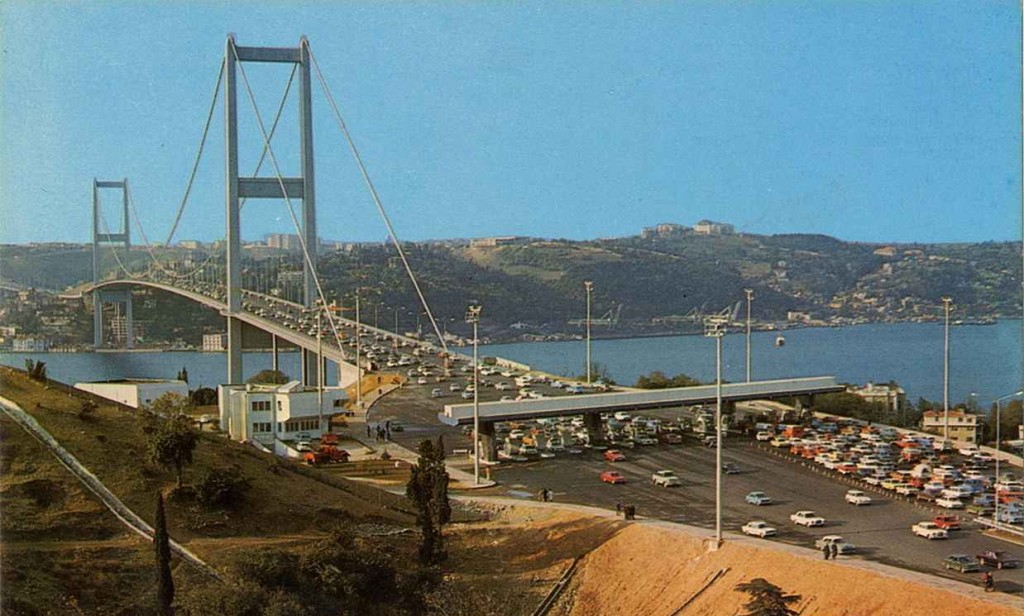
The idea of a bridge crossing the Bosphorus dates back to antiquity. The Greek writer Herodotus says in his Histories that, on the orders of Emperor Darius the Great of the Achaemenid Empire (522 BC–485 BC), Mandrocles of Samos once engineered a pontoon bridge across the Bosphorus, linking Asia to Europe; this bridge enabled Darius to pursue the fleeing Scythians as well as position his army in the Balkans to overwhelm Macedon.
When a storm destroyed the bridge, Darius ordered his soldiers to give the Bosphorus 100 lashes, calling it “wicked water”. Leonardo da Vinci also proposed a suspension bridge over the Bosphorus to Sultan Bayezid II in 1502 or 1503.
More Good News from this Date:
83 years ago today, U.S. President Franklin D. Roosevelt gave an additional one billion dollars in Lend-Lease Act funding to Great Britain to help fund the Allied efforts to win World War II.
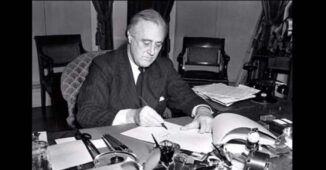
Though FDR had been re-elected on a platform promising to keep America out of the war, Roosevelt wanted to help Churchill and the UK defeat Nazi Germany, which had already swallowed up France and Poland. The legislation sub-titled ‘An Act to Promote the Defense of the U.S.’, allowed American intervention without troops actually entering the war until years later.
The 4 years of aid also went to the Soviet Union, Free France, China, and others, and included food, oil, weaponry, warships, and warplanes. It was mostly free, although in return the U.S. was given leases on military bases across Allied territory. The total of $50 billion donated (half trillion in 2019 dollars) was 17% of the total expenditures of the U.S. during the war which ended 4 years later.
Russia’s Joseph Stalin acknowledged the importance of the $50 Billion intervention saying, “Without American production, the Allies could never have won the war.” (1941)
And, on this day in 2005, the Frauenkirche church in Dresden, Germany, which was destroyed in the firebombing of that city during the Second World War, was re-consecrated after a thirteen-year rebuilding project energized by $10 million in donations from around the world, including a large donation and organizational fundraising from an American who’d seen the church as a child. (READ more of the remarkable story, here, and see the outcome.)

And, on this day in 1938, The War of the Worlds radio drama was broadcast on CBS nationwide, and its unique format of news reporting unintentionally sent the country into a panic. Upwards of a million people actually believed alien Martians had landed. It was the Halloween episode of The Mercury Theatre on the Air produced, directed and narrated by actor and future filmmaker Orson Welles, adapted from the H. G. Wells novel The War of the Worlds.
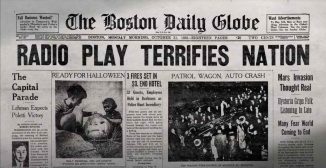
Many had tuned in late and missed the announcement that this was a dramatic play. Instead, they heard what sounded like a news bulletin: “Ladies and gentlemen, we interrupt our evening of dance music to bring you a special bulletin…at 20 minutes before eight… several explosions of incandescent gas… traveling from the planet Mars.”
Also, on this day in 1982, the Australian band Men At Work went to No.1 in the US for the first time with “Who Can It Be Now”.
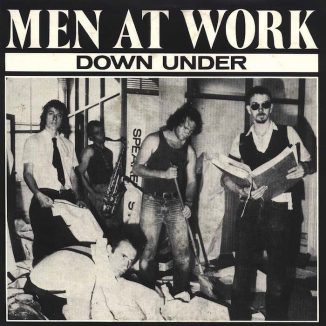 Formed in Melbourne in 1978 by songwriter Colin Hay on lead vocals and Ron Strykert on guitar, their energetic rhythms, reggae-inspired vocals, and quirky sense of humor—and memorable sax riffs by Greg Ham who played flute on their first single “Down Under”—earned them international success and the Grammy Award for Best New Artist, with their debut LP Business as Usual.
Formed in Melbourne in 1978 by songwriter Colin Hay on lead vocals and Ron Strykert on guitar, their energetic rhythms, reggae-inspired vocals, and quirky sense of humor—and memorable sax riffs by Greg Ham who played flute on their first single “Down Under”—earned them international success and the Grammy Award for Best New Artist, with their debut LP Business as Usual.
Happy 85th Birthday to Grace Slick, the singer-songwriter and musician, widely known in rock and roll history for her role in San Francisco’s psychedelic music scene in the mid-1960s with Jefferson Airplane, and later Jefferson Starship.
 Grace Slick then-and-now, 2010 – pubdomain
Grace Slick then-and-now, 2010 – pubdomainSlick’s powerful vocals were featured in a number of well-known songs, including White Rabbit, Somebody to Love, We Built This City, and Nothing’s Gonna Stop Us Now. These days, after more than 20 years sober, she devotes herself to painting, after retiring from music 21 years ago.
Three years ago, she gave Chick-fil-A—whose CEO was known for funding organizations that were against same-sex marriage—permission to use Starship’s 1987 hit Nothing’s Gonna Stop Us Now in a TV ad. Afterward, she donated her portion of the earnings to an LGBT organization. (1939)
Happy Birthday to Henry Winkler who turns 79 today. The actor, comedian, director, and producer skyrocketed to fame for his role as Arthur ‘Fonzie’ Fonzarelli, in the sitcom Happy Days, playing a lovable bad boy who’s into motorcycles.
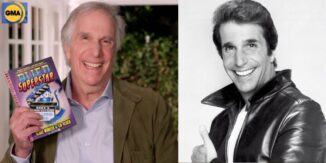
Among his many roles on stage and screen, Winkler regularly appeared on the TV series Arrested Development and Parks and Recreation—and he recently won an Emmy for his supporting role in the dark comedy series Barry.
He landed the breakout role as ‘The Fonz’ on his 27th birthday, and audiences loved him so much that his minor character turned into the star of the show. Later, his agent suggested he write a children’s book about his struggles as a kid with undiagnosed dyslexia, when he was constantly punished and criticized by his father for being “slow, stupid, and not living up to his potential.” He found his niche, however, in theater, and earned an MFA from the Yale School of Drama.
He’s since co-written 35 children’s and young adult books with author Lin Oliver. Together on a book tour via Zoom this year, they introduced Lights, Camera, Danger, the second in an “Alien Superstar” series that speaks to kids who are looking in: “Wanting to be on the inside and always feeling like an outsider… So we wrote about an alien in a very strange land: Hollywood.” WATCH a fun interview this month from Good Morning America… (1945)
SHARE the Milestones, Memories, and Music…
Source link

